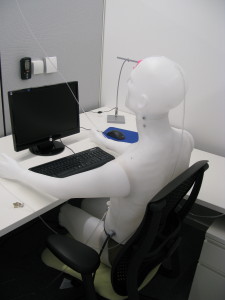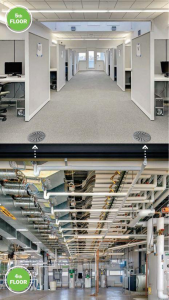The TIEQ Lab is an indoor environmental quality and building HVAC system test bed. Researchers use it to study how multiple factors—including temperature, humidity, air quality, lighting and sound—combine to affect human health and performance in built environments.

The lab space spans between two floors. There is an open mechanical space on the 4th floor and two configurable suites with raised floor systems on the 5th floor, directly above. The building management system is isolated from the building’s main HVAC system and is BACnet compatible for ease of third-party sensor and device integration.
The main air handler and twenty individual air treatment modules are combined to control the relative humidity, temperature and CO2 levels. Temperature, RH, CO2 and VOCs can be monitored at the supply, room or the individual level at each workstation. The system can modulate between 100% outdoor air or 100% recirculated air. This can be applied and measured at both the main or the individual supply levels. The lab can control for sound and both indoor and outdoor lighting. The system is metered for energy measurements of each component.
The mechanical space on the fourth floor allows easy access to the HVAC components and a chase way extends between both suites, spanning both floors, for reconfiguration of ducting.
The 10,000 sq. ft. laboratory’s operating capabilities include:
- Simulation of steady-state and transient indoor environmental
conditions including thermal comfort, air quality, lighting and acoustical quality - Simulation of multi-zone office and classroom settings, and various ventilation, air distribution and environmental control technologies
- Control of the micro-environments around individual occupants;
- Simulation of the interaction between an individual and his/her environment by means of instrumented, breathing thermal manikins
- Evaluation of the impact of outdoor or adjacent zone conditions (temperature, humidity, wind, day-lighting, noise) on the indoor environment through a wall section exposed to the outdoor or adjacent zone environment.
Notably, a group of researchers, sponsored by SyracuseCoE Partner Carrier, undertook a study to learn more about the impact of indoor air quality on cognitive function. See their findings here.
The TIEQ lab is funded by Empire State Development, the New York State Office of Science, Technology and Academic Research (NYSTAR) and Syracuse University.

